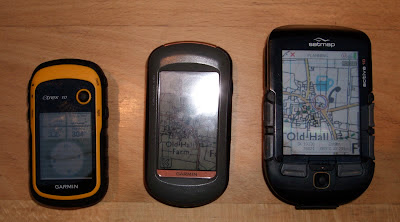Which GPS for Hill Walking?
Choosing a GPS (for Hill Walking)
A friend recently
asked me this question as someone involved in organising GPS training courses
that can be trusted to give an unbiased view. However, even being objective and
unbiased I could only provide an answer within my experience (being confined to
Garmin, SatMap and ViewRanger).
The Smart Phone / View Ranger.
I’ve had View Ranger
on my Phone and smart phone for 5 years and though I find its functions as good
or better than any proper GPS device (easier to use and better functions) I’d
never rely on it for when the chips are down. Phones have poor battery life and
don’t run View Ranger for more than 8 hours. Phone’s are not usually shock
proof, dust proof or water resistant. Great in good conditions. Keep your phone in tact with the
batteries fully charged in case you need to summon help!
GPS Devices.
You need to make a
choice: firstly do you want one that has OS mapping installed or one with out?
Secondly if you have chosen to opt for one with OS mapping, do you want one
that is touch screen or one that you work by pressing buttons?
If you are a competent
navigator perhaps you only need a device in your rucksack for emergencies. If
this is the case and you only want a grid reference to confirm where you are
and the ability to do a “take me to” function then you only need to go for a
bottom of the range model. For
this choice I’d go for the new Garmin Etrex10. A fantastic device at entry
level and so much better than the EtrexH that it replaced.
If you want a device
with OS mapping, you now need to decide whether you want a touch screen model
or one that requires you to press buttons to make it work. I can definitely use
the whole Garmin range using winter gloves though it takes a bit of getting
used to so don’t be put off using a touch screen for this reason.
For me the there is no
real difference in what either the Garmin Oregon touch screen can do over the
cheaper Etrex 20. At the time of writing the Oregon 450 with full UK OS mapping
at 1:50 is retailing on Amazon at £350 whilst the Etrex 20 with the same
mapping is around £320.
The Oregon has a
bigger screen, 50% bigger than the ETrex.
The Etrex battery life
is 25 hours whilst the Oregon is 15 hours.
The Etrex weighs 140
grams whilst the Oregon weighs 190 grams.
The Garmin 62 is a
button controlled model with a screen roughly the same size as the Oregon but
this is a big clumpy machine (I have one).
The Garmin Montanna is
a bigger touch screen model than the Oregon. Big and Clumpy.
In the non Garmin
range, the SatMap 10 has a great reputation though I find the logic difficult
to get to grips with after the Garmin. It is also rather big. Jane (of Peak
Navigation) uses this by choice. The
SatMap has a bigger screen than the Oregon.
Etrex
10 Etrex
20 Oregon
450 SatMap10
Overall Size 5.4 x 10.3 x 5.4
x 10.3 x 5.8
x 11.4 x 7.5
x 13.0 x
3.3 cm 3.3
cm 3.5
cm 3.5
cm
Screen Size 3.6 x 4.3 cm 3.5 x 4.4 cm 3.8 x 6.3 cm 5.3
x 7.1 cm
Battery Life 25
hours 25
hours 16
hours approx
20 hours
Weight
With batteries 141.7 g 141.7 g 192.7 g 175
g
OS Mapping No Yes Yes Yes
Cost of Unit £109.99 £179.99 £329.99 £299.00
Cost of full U.K. N/A £175.00 £175.00 £200.00
OS Mapping 1:50k
Total Cost £109.99 £354.99 £404.99 £499.00
These are manufacturers
RRP’s you will always find them cheaper online!
Left to right: Garmin Etrex 10 Garmin Oregon 450 SatMap Active 10
In the end it’s a
matter of personal choice. Any of
these models will do the job. Read the manufacturers specifications, which are available
online. Once you have decided whether you want mapping or not, either come on
one of our courses to try them out or go to a reputable retailer and try them
out. Don’t be swayed by pushy
sales staff expressing an opinion, go for the one that you find easy or
straightforward to use.
My Choice Etrex
10
Jane’s Choice SatMap
Michael Hunt



